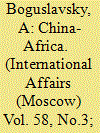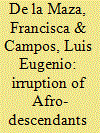| Srl | Item |
| 1 |
ID:
114461


|
|
|
|
|
| Publication |
2012.
|
| Summary/Abstract |
THE OPENING of the 18th Summit of the heads of state of the African Union in Addis Ababa on January 28, 2012 was not quite ordinary. The leaders of African nations attended the cutting of the ribbon ceremony for a modern 100-meter long building of the African Union conference center in the Ethiopian capital built as a gift to Africa from "the government of China." In this connection, the press reported these impressive statistics: the total floor area of the complex is 100,000 square meters; the construction involved 1,200 Chinese and Ethiopian workers at a cost of $200 million to Beijing. The summit heard a lot of important words to the effect that the new complex was to become a symbol of African "revival," a victory over "Afro-pessimists" and a reflection of the continent's development potential in the years ahead.1 Undoubted, however, is also the fact that this gift from China sends a clear message to the international community that China's presence in Africa is in earnest and long-term.
|
|
|
|
|
|
|
|
|
|
|
|
|
|
|
|
| 2 |
ID:
179526


|
|
|
|
|
| Summary/Abstract |
This paper analyses the irruption of Afro-descendants in the sphere of local and national public policies as aresult of their demand for political recognition. Starting in 2000, an Afro-descendant movement developed, positioning itself locally and nationally and obtaining political recognition in 2019 under Law N° 21.151. Incorporating a‘new diversity’ in the design and implementation of public policies as distinct from the indigenous policies that had been implemented for more than 25 years. The paper analyses different levels of state action, relations with other diversities in the implementation of targeted policies (particularly indigenous policies) and the process of Afro-descendant recognition itself. This case shows the difficulties in broadening the social and state vision of cultural diversity and how these are reflected in disputes about the legitimacy of being the ‘original’ peoples as well as for spaces of power and state resources.
|
|
|
|
|
|
|
|
|
|
|
|
|
|
|
|